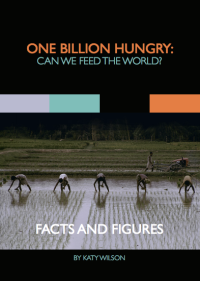Last year we brought you six of our favourite TEDx talks on food security and since then we’ve discovered a whole lot more. Here are nine more interesting talks we think you might like.
 Josette Sheeran, former head of the UN’s World Food Program, talks about why, in a world with enough food for everyone, people still go hungry, still die of starvation, still use food as a weapon of war. Her vision: “Food is one issue that cannot be solved person by person. We have to stand together.” Watch the video.
Josette Sheeran, former head of the UN’s World Food Program, talks about why, in a world with enough food for everyone, people still go hungry, still die of starvation, still use food as a weapon of war. Her vision: “Food is one issue that cannot be solved person by person. We have to stand together.” Watch the video.
 Mark Bittman, New York Times food writer, weighs in on what’s wrong with the way we eat now (too much meat, too few plants; too much fast food, too little home cooking), and why it’s putting the entire planet at risk. Watch the video.
Mark Bittman, New York Times food writer, weighs in on what’s wrong with the way we eat now (too much meat, too few plants; too much fast food, too little home cooking), and why it’s putting the entire planet at risk. Watch the video.
 Brian Halweil, publisher of Edible Manhattan, was on track to become a doctor until he realized that repairing the global food system could help to conserve people’s health and wellbeing more. Halweil believes that the local food movement is a truly powerful medicine. Watch the video.
Brian Halweil, publisher of Edible Manhattan, was on track to become a doctor until he realized that repairing the global food system could help to conserve people’s health and wellbeing more. Halweil believes that the local food movement is a truly powerful medicine. Watch the video.
 La Donna Redman, Senior Program Associate in Food and Justice at the Institute for Agriculture and Trade Policy and long-time food activist, examines how the root causes of violence and public health concerns experienced by her community are strongly connected to the local food system, and are best addressed by making changes in that system. Watch the video.
La Donna Redman, Senior Program Associate in Food and Justice at the Institute for Agriculture and Trade Policy and long-time food activist, examines how the root causes of violence and public health concerns experienced by her community are strongly connected to the local food system, and are best addressed by making changes in that system. Watch the video.
 Birke Baehr, at the time just 11-years old, presents his take on a major source of our food — far-away and less-than-picturesque industrial farms. Keeping farms out of sight promotes a rosy, unreal picture of big-box agriculture, he argues, as he outlines the case to green and localize food production. Watch the video.
Birke Baehr, at the time just 11-years old, presents his take on a major source of our food — far-away and less-than-picturesque industrial farms. Keeping farms out of sight promotes a rosy, unreal picture of big-box agriculture, he argues, as he outlines the case to green and localize food production. Watch the video.
 Mark Post, a specialist in tissue engineering at Maastricht University in The Netherlands introduces Cultured Beef to the world and explains the process behind its growth and the future he envisions for in-vitro meat. Watch the video.
Mark Post, a specialist in tissue engineering at Maastricht University in The Netherlands introduces Cultured Beef to the world and explains the process behind its growth and the future he envisions for in-vitro meat. Watch the video.










